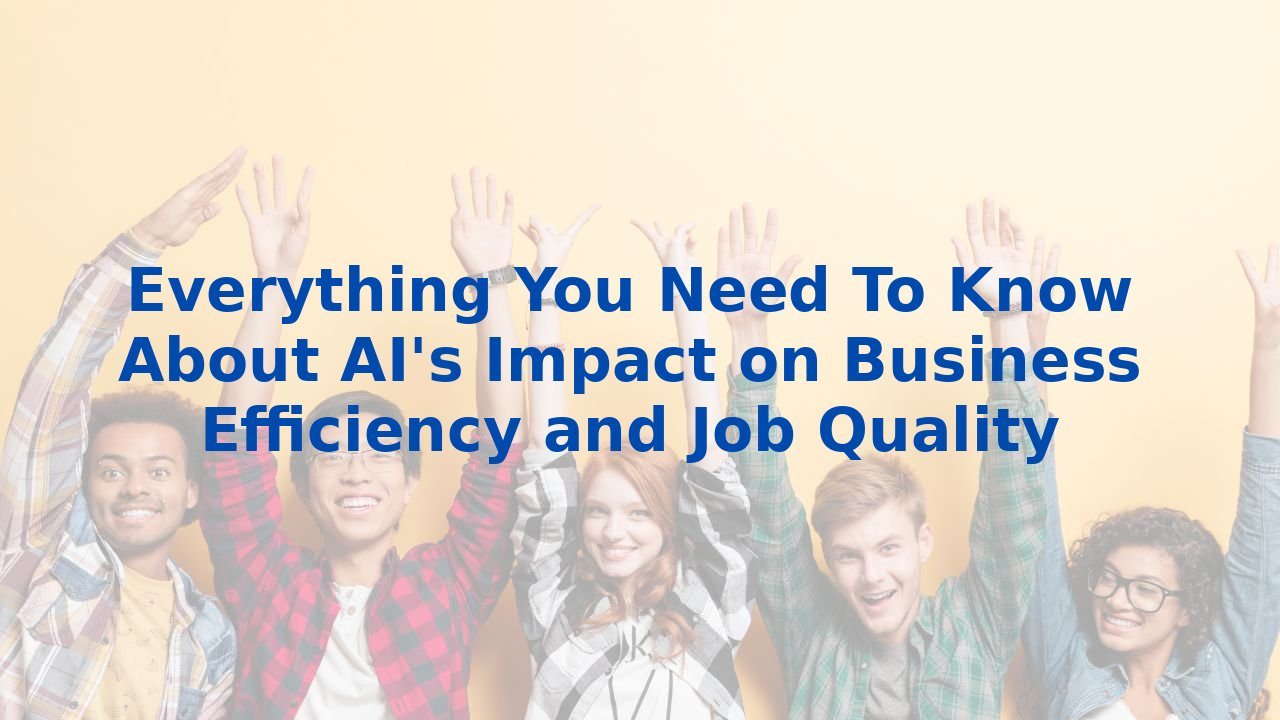Everything You Need To Know About AI's Impact on Business Efficiency and Job Quality
Everything You Need To Know About AI's Impact on Business Efficiency and Job Quality
In the fast-paced world of business, the advent of Artificial Intelligence (AI) is akin to a supercharged engine, driving unprecedented efficiency and enhancing the quality of jobs. As we delve deeper into this new era, understanding how AI reshapes our business processes and workplace dynamics becomes essential for every leader and contributor in an organization. This exploration not only highlights AI's transformative role but also underscores the importance of equipping our workforce with the necessary skills.
Improving Business Efficiency with AI
AI is not a concept of tomorrow; it is a reality that businesses around the globe are embracing today. Recent statistics reveal that over 42% of enterprises have harnessed AI in their operations, and an additional 40% are exploring its potential. This commitment demonstrates a readiness to integrate AI's capabilities into various aspects of business, ushering in improvements that were once imagined only in futurist scenarios.
Key Benefits of AI for Business Efficiency
1. Efficiency and Automation
One of the standout features of AI is its ability to automate repetitive tasks. By taking over mundane responsibilities, AI allows employees to redirect their energy toward higher-value activities. For example, robotic systems in warehouses can handle order picking and packing, resulting in substantial labor cost reductions. Meanwhile, AI-powered chatbots manage routine customer service inquiries, thereby freeing human agents to tackle more complex situations that require personal touch.
2. Data-Driven Decision Making
AI's prowess in analyzing and synthesizing vast amounts of data is revolutionizing how decisions are made. Firms can enhance their strategic choices significantly by deriving actionable insights from the myriad of data generated daily. Studies predict that such capabilities may boost employee productivity by up to 40% by 2035 as companies become more adept at leveraging big data analytics.
3. Workplace Safety and Health
AI also plays a pivotal role in promoting workplace safety. By predicting potential hazards and monitoring employee fatigue through sophisticated technologies, organizations can mitigate risks associated with high-stress environments. Enhanced safety protocols reduce workplace incidents, thereby fostering a healthier work culture.
4. Employee Training and Development
A key advantage of integrating AI is its contribution to employee training and development. AI tools can assess skill gaps within teams and deliver customized training, facilitating personal growth and propelling collective success. As AI assumes the burden of routine tasks, employees are empowered to develop and utilize new skills, leading to improved overall proficiency.
5. Cost Savings and Resource Optimization
AI not only streamlines processes but also leads to remarkable cost savings. By automating mundane tasks and generating insights on operational efficiencies, organizations can allocate resources more effectively. For instance, employing AI-driven forecasting can accurately predict customer demand, minimizing waste and enabling better inventory management.
6. Innovation and Competitive Advantage
AI is, at its core, an engine of innovation. Its capacity to accelerate research and development cycles empowers businesses to bring new products to market faster. This accelerated innovation process can set an organization apart in a competitive landscape, as evidenced by companies optimizing their supply chains through AI technologies.
The Role of Employee Training in AI Adoption
The success of AI implementation hinges on the strategic training of our workforce. It's not merely about adopting the technology, but cultivating an environment where employees can thrive alongside it. Here are some pivotal factors to consider:
1. Understanding AI Capabilities
Employees must grasp how AI operates and the scope of its applications within the organization. This awareness serves as the foundation for effective collaboration between humans and AI technologies.
2. Developing AI Skills
Investing in comprehensive training programs is crucial. Employees should be equipped with the skills to navigate AI tools effectively, from data analysis to machine learning basics. This empowerment transforms them into valuable assets capable of harnessing AI's full potential.
3. Adapting to New Roles
As AI reshapes job responsibilities, employees should be ready for an evolution in their roles. This shift requires not just adaptability but a proactive approach in acquiring new skills that align with emerging job functions.
4. Ethical Considerations
Lastly, ethical implications cannot be overlooked. Ensuring that employees are educated on data privacy and bias in AI decision-making is crucial for fostering responsible AI usage and protecting organizational integrity.
Conclusion
The integration of AI in business is more than a mere technological upgrade; it’s a defining shift towards enhanced efficiency and job quality. While the benefits of AI are profound—ranging from automation to increased innovation—the true value lies in our commitment to training and developing our workforce. By prioritizing employee development, we unlock the full potential of AI, ensuring that as our organizations evolve, our people do as well.
To learn more about enhancing your team's capabilities with AI training solutions, consider exploring what tailored programs can offer your workforce. The journey towards AI integration begins with understanding and empowering those who will control its course.



